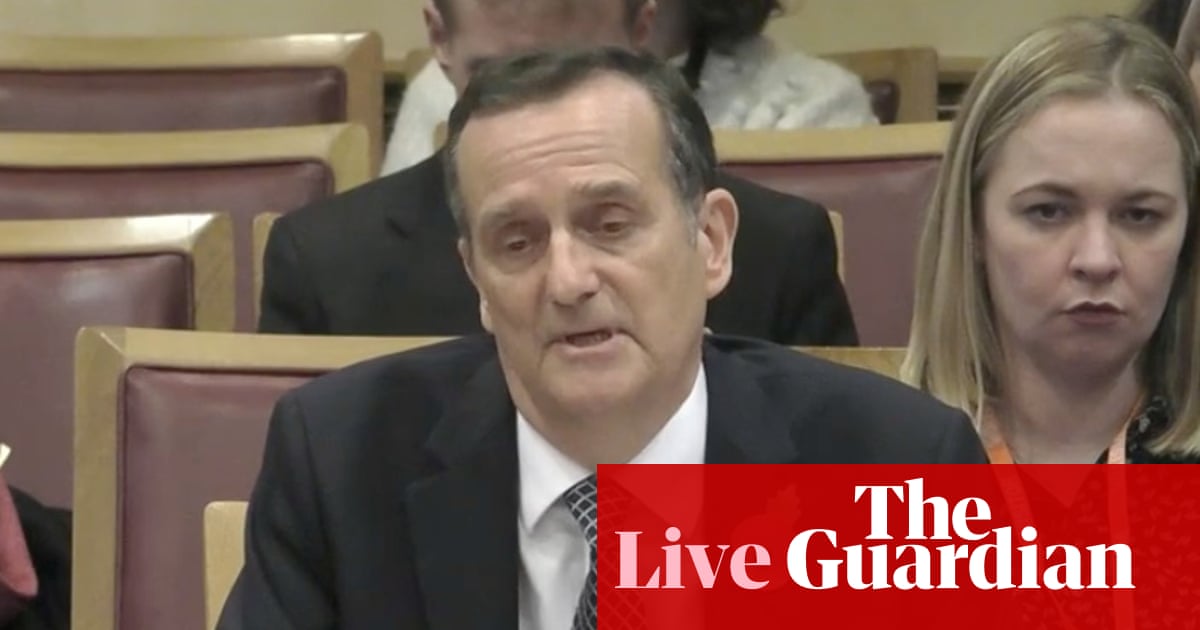
Key events
-
9h ago
Early evening summary
-
10h ago
DNSA says he does not think there are ‘huge differences’ between Tories’ China policy and Labour’s
-
10h ago
DNSA suggests he was not aware trial would collapse when he told CPS he would not say China posed national security theat
-
10h ago
Parkinson rejects claim Labour manifesto quote in witness statement killed off successful prosecution
-
11h ago
Mark Sedwill criticises CPS for treating government policy documents as statements of fact about China threat
-
11h ago
Judge would have thrown out China spy case before it even went to jury, DPP claims, given lack of key security evidence
-
11h ago
Lead counsel in China spy case says DNSA’s response to ‘million dollar question’ meant case had to be dropped
-
11h ago
Stephen Parkinson, DPP, tells MPs that ‘nothing reached’ him to suggest government wanted China spy case to fail
-
11h ago
Lammy says he was ‘livid’ about accidental release of Epping sex offender
-
11h ago
MPs to question DPP, deputy national security adviser and cabinet secretary on collapse of China spy case
-
12h ago
Reeves suggests that spending cuts, as well as tax rises, could be needed to ensure budget sums add up
-
12h ago
Meta and X won’t deal with abuse problem on their platforms unless they are forced to do so by law, say MPs
-
13h ago
Farage claims ‘DEI industry has gone crackers’ – as he ducks question about whether he wants fewer black actors in TV ads
-
13h ago
Farage suggests he is not in favour of parlimaent ‘hounding’ Prince Andrew
-
13h ago
Farage claims people overstating extent to which Caerphilly byelection result showed tactical voting against Reform
-
13h ago
Farage suggests he would have suspended whip from Pochin if he thought she was intentionally racist
-
13h ago
Farage says Pochin’s comment was ‘ugly’, and he’s not happy about it, but he does not think her intention was racist
-
14h ago
Farage says grooming gangs inquiry should be carried out quickly by parliamentary committee or commission
-
14h ago
Farage says grooming gangs scandal driven by racism, and establishment has responded with ‘cowardice and neglect’
-
14h ago
Farage holds press conference
-
14h ago
Starmer condemns Farage for failing to take action over Sarah Pochin’s ‘racism’
-
14h ago
Starmer says he’s ‘frustrated and angry’ by asylum hotel ‘mess’ left by Tories
-
15h ago
Two Reform UK councillors in Kent expelled from party after suspension
-
15h ago
No 10 says accidental release of Epping sex offender another sign of ‘justice system crisis inherited by this government’
-
15h ago
Labour challenges Farage to withdraw whip from Sarah Pochin over ‘racist’ comment about black and Asian people in TV ads
-
16h ago
Labour’s decision to cut time refugees get to find alternative housing ‘extremely disappointing’, committee says
-
16h ago
What Commons home affairs committee said about Home Office’s ‘chaotic’ asylum hotels policy under Tories
-
17h ago
Social landlords in England now forced to fix emergencies within 24 hours
-
18h ago
Green party calls for Home Office to be broken up, saying seperate department should handle migration
-
18h ago
England and Wales prison checks to be enhanced after inmate released in error
-
19h ago
Minister says government committed to getting all asylum seekers out of hotels after report says system ‘chaotic’
Show key events only
Please turn on JavaScript to use this feature
Early evening summary
-
Stephen Parkinson, the director of public prosecutions, has rejected claims that the inclusion of a line about Labour’s policy towards China, quoting from its manifesto, killed off the prospect of the alleged China spies being prosecuted. (See 5.42pm.) The ‘Labour manifesto quote’ in one of the witness statements has been cited by Tories as evidence to support their claim that the government intervened to collapse the trial. In evidence to a parliamentary committee, Parkinson and other witnesses did not say anything to substantiate these allegations. Instead, they backed the government’s argument that the case collapsed because espionage legislation had not been updated and because it was the previous government’s policy not to call China a national security threat.
Share
Updated at 19.56 CET
Collins says, in court, he would not have described China as a generic threat – because that was not the government policy at the time.
But he would have set out all the ways in which China did pose a threat, he says.
Share
DNSA says he does not think there are ‘huge differences’ between Tories’ China policy and Labour’s
Collins told the committee that he did not think there were “huge differences” between the Conservative government’s policy towards China and Labour.
Asked why he included a line about Labour’s policy in his final witness statement, Collins said he was asked to include that by counter-terrorism police. They wanted current government policy mentioned.
He said he was not consciously quoting the Labour manifesto. He had taken the line about the government wanting to cooperate where it could, compete where it needed to and challenging where it had from a parliamentary statement.
UPDATE: Collins said:
I was asked to include a reference to the new government’s policy by Counter Terrorism Police (CTP), for fear that there would be a wedge driven between my witness statements and the new Government’s policy. I did that.
Just as a point of fact, I drew from an answer to a parliamentary question, rather than the Labour party manifesto.
Share
Updated at 19.39 CET
DNSA suggests he was not aware trial would collapse when he told CPS he would not say China posed national security theat
Collins says, when he draw up his first witness statement, he had not discussed that with the CPS. It was discussed with counter-terrorism police, who were investigating, and with his own legal team.
Q: In your follow-up witness statements, why could you not describe China as a threat to national security?
Collins says he set out the various ways China did pose a threat.
But he says he did not describe China as an overall threat in generic terms.
Q: Why did you do that? Was that your judgment?
Collins says he was reflecting government policy at the time. At the time the government did not describe China as a threat in a generic sense. He was describing the way China posed threats that the UK needed to protect itself from. He accepts this is a “very fine distinction”.
Q: Did anyone tell you to say that China was not a threat?
Collins says his legal team, and counter-terrorism police, were involved in the first witness statement. And that was shared with the PM.
After that, he was told he could not share witnesses statement. So further witnesses statements were just drawn up with his small team, and with counter-terrorism policy.
Q: When did you find out that the trial might collapse because of the limits of what you were saying in your evidence?
Collins says the first time he became aware the case might collapse was on 3 September, when he was told this at a meeting with the DPP.
In his letter, Parkinson said the key meeting where Collins said that he would not state in court that China was a threat to national security at the relevant time, and that he would accept, if asked, that China was not an enemy, took place on 14 August. This was Collins failing to answer the “million dollar question”, as Little put it. (See 4.56pm.)
But, on the basis of what Collins is saying, he did not realise he was collapsing the case when he said that.
Matthew Collins at JCNSS Photograph: HoCShare
Updated at 19.24 CET
After a short break, the joint committee on the national security strategy is now taking evidence from Matthew Collins and Chris Wormald. (See 4.31pm.)
The chair, Matt Western, asks Collins how he feels about the collapse of this case.
Collins replies: “Disappointed.”
He says he wanted to see this succeed. He knew a lot of people had put a lot of work into this.
But he knew that the Official Secrets Act 1911 would have made things difficult.
Q: We have heard a lot about Labour’s “cooperate, compete, challenge” mantra. Was that the policy at the time these alleged offences were committed?
No, says Collins. But he says the relevant evidence was about the government’s policy at the time.
Share
Parkinson rejects claim Labour manifesto quote in witness statement killed off successful prosecution
Karen Bradley, the Tory chair of the home affairs committee, is asking the questions now.
Q: In the final witness statement, the DNSA quotes from Labour’s manifesto when describing the government’s China policy. (It said the government’s policy was cooperating where it could, competing where it needed to, and challenging where it had to).
(This question seems prompted by a Daily Mail report claiming the Labour manifesto quote was the “fatal blow” to the prosecution.)
Parkinson says he was not aware that was a quote from the Labour manifesto.
He says the case failed because of the evidence given in its totality.
Share
Little says the CPS considered whether it would have been possible to charge the accused over other offences.
But he could not see an alternative charging route, he says
Share
Mark Sedwill criticises CPS for treating government policy documents as statements of fact about China threat
Mark Sedwill, the former cabinet secretary and former national security adviser, who now sits in the Lords as a crossbench peer, goes next.
Q: Why did you just ask for security evidence from the deputy national security adviser (DSNA)?
Parkinson says the choice was made by those investigating the allegations (counter-terrorism police).
He says Matthew Collins, the DSNA, seemed a suitable expert witness.
If they had called another witness, that might have undermined the case.
Sedwill says the CPS could have found other witnesses to say China is an national security threat – even if the government chooses not to use that language for its own reasons. Why didn’t you do that?
Parkinson said if other witnesses had been called, that would have undermined Parkinson, who they had to call.
He says Collins is there to represent the government’s view. He quoted from the integreted reviews of defence and security. And those referred to China as a challenge.
Sedwill says the integreted reviews were statements of policy, not statements of fact.
He says government policy documents are drafted with various objectives in mind.
He says China is a national security threat and an economic opportunity. Various governments have tried to reconcile that tension for decades.
Sedwill says the CPS should have gone to other sources to get a statement of fact.
Little says it would not have been possible to call a witness to undermine what another of his witnesses was saying.
Share
Updated at 18.28 CET
Paul Boateng, the Labour peer and former cabinet minister, goes next.
Q: Was anything said by “senior people” led you to reconsider the evidence?
Parkinson said it was just counsel and colleagues in the CPS who took this decision.
The attorney general was informed of the decision to drop the case. He was not consulted.
Parkinson said they told the AG that the CPS could not satisfy the “enemy” requirement under the law.
Boateng says China was deemed a threat to the integrity of the UK’s democratic institutions. He asks how that meant it would not be a threat.
Parkinson says that is a question they should ask the DNSA, who is giving evidence later.
Share
Q: Why did you not put this to a judge anyway?
Little says it would not be proper to refer the case to a judge if the CPS did not believe it had the right evidence.
Tom Little at JCNSS Photograph: HoCShare
Judge would have thrown out China spy case before it even went to jury, DPP claims, given lack of key security evidence
Emily Thornberry, a barrister and chair of the foreign affairs committee, is asking the questions now.
She suggests that the evidence should have persuaded a jury that China was an enemy.
Parkinson says that may have been the case when they charged. But the case law changed as a result of the Roussev case (a Bulgarian/Russian spy trial).
He says Roussev meant the CPS had to show that the totality of the threats meant China was a threat to national security.
So the CPS asked for more. They asked for a statement from the DNSA.
But it turned out this was not just “a sticking point”, but a “critical difference”.
Q: But the court of appeal said they were not redefining the word enemy, and they were going to apply the word enemy in “a common sense way”. That means leaving it up to the jury, doesn’t it? The Roussev judgment was not imposing a restrictive definition.
Parkinson disputes this. The CPS felt it had to act within the ambit of the court of appeal ruling.
Thornberry repeats her point – that the CPS should have put this to a jury.
Parkinson says the CPS’s assessment was that this would never get to a jury.
He says their only witness was not willing to say China was an active threat.
Stephen Parkinson at JCNSS Photograph: HoCShare
Lead counsel in China spy case says DNSA’s response to ‘million dollar question’ meant case had to be dropped
Tom Little KC, first senior Treasury counsel and the barrister instructed to prosecute the case, said he realised they have to drop the case when the deputy national security adviser told them that he was not willing to say in evidence that China posed a risk to national security at the relevant time.
Parkinson said, on the basis of that, the CPS concluded that the judge would not have allowed the case to go before the jury.
UPDATE: Little said the DNSA “was clear to me that he would not say that China posed an active threat to national security at the material time”. He went on:
That was in answer to what I regard as the million dollar question in the case, and once he had said that the current prosecution for those charges was effectively unsustainable, that’s my carefully reflected position.
I didn’t jump to that immediately. I advised on 22 August, having reflected over it. As far as those charges were concerned.
There was other discussion then about alternative charges.
But I don’t think anyone should misunderstand the effect of what the witness had said, that would have been disclosable, and it brought this case effectively to a crashing halt as far as that was concerned with that witness, who is the deputy national security adviser to the cabinet, it’s very different to the position of giving away a witness who witnesses a criminal incident on the street for reasons that I hope are obvious, but we did give very careful consideration as to whether this was remediable, and I concluded, but more importantly, we concluded, that is the entire prosecution team, that it was not.
Share
Updated at 18.33 CET
Parkinson says the prosecution failed because the CPS did not have the evidence it needed.
He said, as a result of changes to the case law after the two accused were charged, the CPS had to prove that China posed an active threat to national security.
He sets out this case in more detail in his letter to the committee.
Share
Stephen Parkinson, DPP, tells MPs that ‘nothing reached’ him to suggest government wanted China spy case to fail
At the joint committe, Stephen Parkinson, the DPP, is now giving evidence.
Matt Western, the chair, is asking questions.
Q: Who do you think is to blame for this prosecution failing?
Parkinson started by saying how “disappointed” he was that this case failed.
He goes on:
If I may say so, I don’t think it is a question of blame. The responsibility of prosecutors is to place cases before the court on the basis of sufficient evidence to secure conviction.
And ultimately, the issue in this case is that we were not able to provide the evidence to sustain the case in respect of one essential element, which is the evidence that China was an enemy, as was required, by the statute.
Q: Did you ever get the feeling that the government wanted this case to fail?
Parkinson replied: “Nothing reached me [to that effect].”
Share
Lammy says he was ‘livid’ about accidental release of Epping sex offender
Lammy told MPs that he was “livid” on behalf of Hadush Kebatu’s vicitms about his accidental release.
He went on:
This was a mistake that should not have happened. But victims expect better. The public expects better at this. Government expects better from [this] critical public service.
He said Kebatu would be deported imminently.
Share
David Lammy, the justice secretary and deputy PM, is making a Commons statement about the mistaken release of the Epping sex offender Hadush Kebatu. There is a live feed here.
UK Justice Minister Lammy makes statement on wrongly-released asylum seeker – watch liveShare

